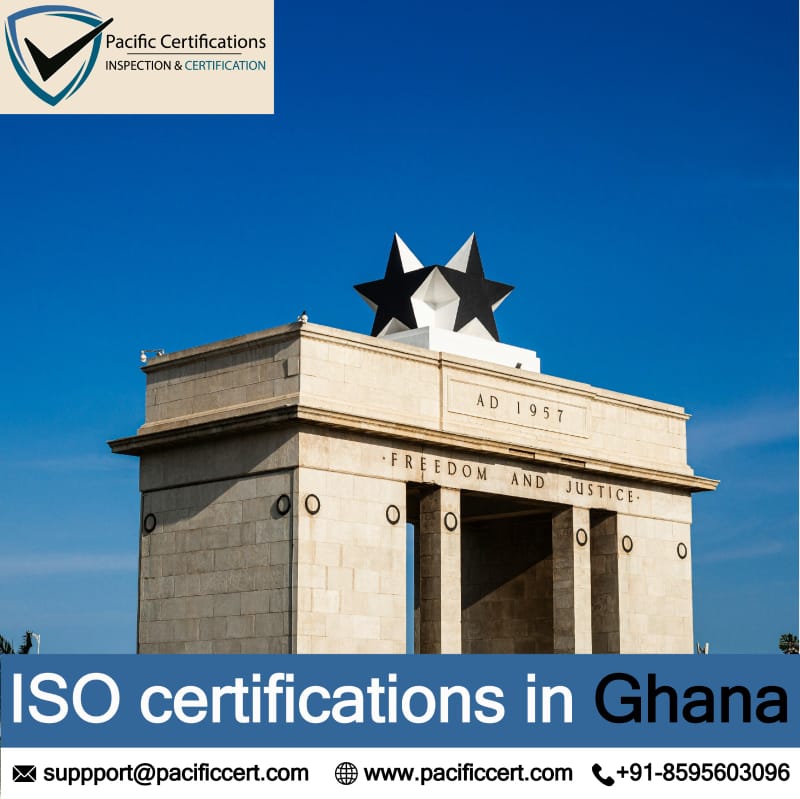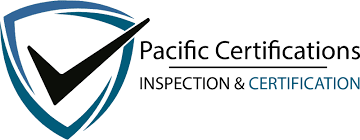ISO Certifications in Ghana, Popular Standards, Requirements and Benefits

Introduction
ISO certifications are globally recognized standards that ensure the quality, safety, efficiency, and reliability of products and services. In Ghana, businesses across various sectors are increasingly recognizing the importance of ISO certifications to enhance their credibility, operational efficiency, and market competitiveness
Key ISO standards applicable in Ghana
ISO 9001:2015 - Quality Management Systems:
This standard specifies requirements for a quality management system (QMS). Organizations use it to demonstrate their ability to consistently provide products and services that meet customer and regulatory requirements.
ISO 14001:2015 - Environmental Management Systems:
ISO 14001 provides a framework for environmental management best practices to help organizations minimize their environmental footprint.
ISO 45001:2018 - Occupational Health and Safety Management Systems:
This standard provides a framework to manage workplace health and safety, reducing workplace incidents and ensuring a safe working environment.
ISO 27001:2022 - Information Security Management Systems:
ISO 27001 helps organizations manage the security of assets such as financial information, intellectual property, employee details, or information entrusted by third parties.
ISO 22000:2018 - Food Safety Management Systems:
This standard specifies the requirements for a food safety management system that enables an organization to demonstrate its ability to control food safety hazards and ensure food is safe for consumption.
ISO 50001:2018 - Energy Management Systems:
ISO 50001 provides a framework to help organizations manage and improve their energy performance, increase energy efficiency, and reduce energy costs.
How we at Pacific Certifications can help?
At Pacific Certifications, we specialize in providing ISO certification services to businesses in Ghana. Our role is to audit and certify your organization against the relevant ISO standards, ensuring that you meet all the requirements to achieve certification. Here’s how we can help:
Certification Audits: Our team of experienced auditors will conduct thorough assessments to verify that your management systems comply with the chosen ISO standards.
Surveillance Audits: After certification, we perform periodic surveillance audits to ensure continuous compliance and improvement.
Re-certification Audits: We offer re-certification audits to renew your certification upon expiry, helping you maintain your certification status.
Global Trends and Research on ISO Certifications
Digital Transformation and ISO 27001
With the rise of cyber threats, there’s a growing emphasis on ISO 27001 certification. Organizations worldwide are prioritizing information security to protect their data and maintain customer trust.
Sustainability and ISO 14001
Environmental sustainability is a global priority. Companies are increasingly adopting ISO 14001 to demonstrate their commitment to sustainable practices and regulatory compliance
Health and Safety Focus with ISO 45001
Post-pandemic, there’s a heightened awareness of occupational health and safety. Businesses are adopting ISO 45001 to ensure a safer working environment and compliance with health regulations
Energy Efficiency and ISO 50001
In response to rising energy costs and environmental concerns, businesses are implementing ISO 50001 to enhance their energy management systems and reduce their carbon footprint
News and Developments
Ghana’s Government Endorsement of ISO Standards
The Ghanaian government has been actively promoting the adoption of ISO standards to improve the quality of products and services, boost exports, and enhance economic growth
ISO Certification in Ghana’s SME Sector
Small and medium-sized enterprises (SMEs) in Ghana are increasingly pursuing ISO certifications to gain a competitive edge and expand into international markets
Moreover, various industry associations in Ghana are collaborating with certification bodies to provide resources and support for businesses seeking ISO certification
ISO certifications play a crucial role in enhancing the operational standards and market credibility of businesses in Ghana. At Pacific Certifications, we are committed to providing expert auditing and certification services to help your organization achieve and maintain ISO certification
For more information or to start your certification journey, contact us at [email protected]
Let us help you achieve excellence through ISO certification!
Requirements of ISO Certifications in Ghana
ISO certifications aim to ensure that organizations meet specific standards in quality, safety, environmental management, or other areas depending on the specific ISO standard. Here's an overview of the general process and requirements for achieving ISO certification in Ghana:
Understanding the Standard
Before beginning the certification process, it's essential that the organization thoroughly understands the specific ISO standard they are seeking to implement. This involves studying the standard to comprehend its requirements, which can include quality management principles, environmental impacts, safety protocols, or security practices, depending on the standard like ISO 9001, ISO 14001, ISO 45001, or ISO 27001.
Gap Analysis
Organizations often start with a gap analysis to determine their current state compared to the requirements of the ISO standard. This step identifies areas that need improvement to meet the standard's requirements
Planning and Implementation
Based on the gap analysis, the organization needs to plan and implement changes to bridge the gaps. This may involve developing new procedures, training staff, changing existing processes, or implementing new tools and technologies. Detailed documentation is crucial as it forms the backbone of the audit process
Documentation
Proper documentation is critical in the ISO certification process. This includes documenting the processes, changes made, and various activities performed to meet the standard's requirements. Documentation serves as evidence of compliance and is thoroughly reviewed during the certification audit.
Employee Training
Training employees is essential to ensure everyone understands their roles and responsibilities within the ISO framework. Effective training ensures that processes are performed correctly and consistently, which is necessary for passing the certification audit.
Internal Audit
Before undergoing a formal external audit, it's advisable to conduct an internal audit. This audit is a self-assessment to ensure that the implemented system meets the ISO standards and to correct any discrepancies.
Management Review
Senior management should review the implementation outcomes, internal audit results, and overall compliance with the ISO standard. This review assesses the effectiveness and sufficiency of the management system and identifies areas for improvement.
Certification Audit
The certification audit is conducted by an external body, like us, Pacific Certifications. It usually consists of two stages:
Stage 1: A preliminary audit to check the readiness of the organization for the full certification audit, focusing on documentation and planning.
Stage 2: The main audit, where the effectiveness of the management system is thoroughly evaluated.
Continual Improvement
ISO standards require continual improvement, meaning the organization should consistently use the outcomes of audits and management reviews to enhance the management system's effectiveness.
Achieving ISO certification in Ghana can boost an organization’s credibility and efficiency, open up new market opportunities, and increase customer satisfaction by ensuring consistent quality of services and products.
Benefits of ISO Certifications in Ghana
ISO certifications offer numerous benefits to organizations in Ghana, spanning across various industries. These certifications are all about enhancing operational efficiency, improving product quality, and increasing customer satisfaction
Here’s a detailed look at the key benefits of obtaining ISO certifications for businesses in Ghana
Enhanced Credibility and Brand Image: By achieving ISO Certifications, organizations in Ghana can enhance their credibility and strengthen their brand image. This recognition can be particularly beneficial in competitive markets and is often a prerequisite when dealing with global business partners or entering foreign markets
Access to New Markets: Many markets, both local and international, require suppliers to have ISO certifications. For instance, ISO 9001 (Quality Management Systems) is often a basic requirement for doing business in many industries. This certification can thus open new doors and provide access to markets that were previously inaccessible due to compliance issues.
Improved Efficiency and Cost Management: ISO standards, such as ISO 9001, ISO 14001, and ISO 45001, are designed to optimize operations. They introduce efficiency through the standardization of processes and by focusing on continual improvement. These improvements can lead to significant cost savings, as processes become more streamlined and less wasteful
Enhanced Customer Satisfaction: ISO standards help ensure that customers receive consistent, good quality products and services, which, in turn, can lead to repeat customers and fewer complaint
Improved Risk Management: By encouraging the identification and assessment of risks within the organization, ISO certifications like ISO 27001 for information security, ISO 45001 for occupational health and safety, and ISO 14001 for environmental management, can help in better managing and mitigating risks. This proactive approach can protect assets, reduce the likelihood of accidents and incidents, and ensure regulatory compliance
Operational Resilience: ISO standards require a systematic approach to managing key processes, from risk management to resource allocation. This not only ensures operational consistency and efficiency but also helps organizations quickly adapt to disruptions while maintaining service levels, hence enhancing resilience.
Employee Engagement and Development: ISO certifications require training and involvement of employees in the process of quality management, safety protocols, or environmental awareness, depending on the specific standard. This involvement can increase employee engagement and satisfaction as they understand their roles better and see how they contribute to the organization’s objectives.
Regulatory Compliance: Many ISO standards incorporate legal and regulatory requirements into their criteria. For organizations in Ghana, adhering to these standards helps ensure compliance with local and international laws and regulations, thus avoiding legal issues and potential fines.
Sustainability and Environmental Performance: For organizations focused on environmental management (ISO 14001), certification helps in systematically reducing negative environmental impacts. This is increasingly important as both local and global stakeholders demand more sustainable business practices.
Better Supplier Relationships: Having an ISO certification also improves relationships with suppliers through the proper setting of quality criteria and standards. This helps in achieving a more consistent product quality from suppliers and reduces the time required to source and validate new suppliers.
Which industries need ISO Certifications in Ghana?
In Ghana, ISO certifications help organizations to meet international standards, enhance efficiency, improve product quality, and increase marketability. Below are some key industries in Ghana where ISO certifications are particularly important:
Manufacturing
ISO 9001 (Quality Management Systems): Helps ensure consistent quality in products and enhances customer satisfaction.
ISO 14001 (Environmental Management Systems): Important for managing environmental impacts of manufacturing processes.
ISO 45001 (Occupational Health and Safety Management Systems): Crucial for ensuring the safety of workers in manufacturing facilities.
Construction
ISO 9001: Ensures quality in construction processes and materials.
ISO 14001: Helps construction companies manage their environmental footprint effectively.
ISO 45001: Essential for maintaining safety standards on construction sites.
Healthcare
ISO 9001: Enhances the quality of healthcare services and management.
ISO 27001 (Information Security Management Systems): Particularly important for protecting patient data and health information systems.
Information Technology
ISO 27001: Essential for IT companies to manage information security effectively.
ISO 20000 (Service Management): Helps IT companies manage and deliver services effectively.
Agriculture and Food Production
ISO 22000 (Food Safety Management Systems): Ensures safety and quality in food processing and production.
ISO 14001: Helps manage environmental impacts of agricultural practices.
Mining
ISO 14001: Important for managing environmental impacts of mining activities.
ISO 45001: Essential for ensuring safety in potentially hazardous mining environments.
Education
ISO 21001 (Educational Organizations Management Systems): Helps educational institutions enhance their educational systems and processes.
Financial Services
ISO 27001: Ensures the security of financial transactions and data.
ISO 22301 (Business Continuity Management Systems): Helps financial institutions prepare and manage business disruptions effectively.
Telecommunications
ISO 27001: Critical for securing information and networks in telecommunications.
ISO 9001: Helps in managing quality of services provided to customers.
Tourism and Hospitality
ISO 9001: Enhances customer service and operational efficiency.
ISO 22000: Ensures food safety in hotels and restaurants.
Conclusion
Businesses in Ghana can leverage ISO certifications to enhance operational efficiencies and to boost their competitiveness both in local and international markets. We at Pacific Certifications can facilitate the process of achieving these certifications, ensuring that the standards are implemented effectively and maintained over time.
Pacific Certifications is accredited by ABIS, in case you need support with ISO certification for your business in Ghana, please contact us at [email protected] or +91-8595603096.
Ready to get ISO certified?
Contact Pacific Certifications to begin your certification journey today!
Suggested Certifications –
Read more: Pacific Blogs
